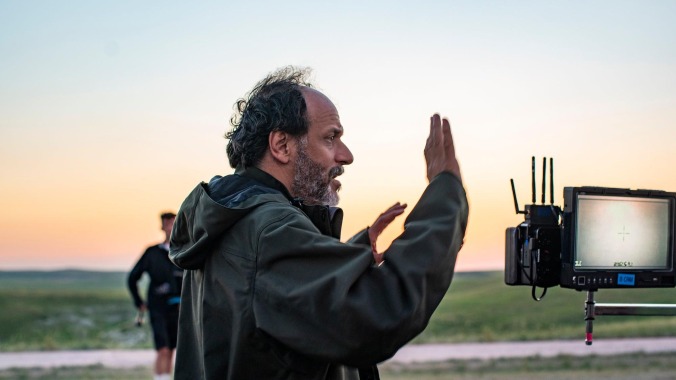How Bones And All director Luca Guadagnino transitioned from Call Me By Your Name to cannibal love stories
"Every movie is a new chapter:" Director Luca Guadagnino talks about his latest buzzy project with Timothée Chalamet

For his new film Bones And All, director Luca Guadagnino beautifully combines many of the extraordinary qualities of his previous two projects, the mesmerizing one-two punch of Call Me By Your Name and his remake of Dario Argento’s Suspiria. He reaches back to the 1980s setting and fledgling romance of the former, while tapping into the deeper themes and genre conventions of the latter. The result is an unforced but unforgettably stylish portrait of a young woman (Taylor Russell) at odds with the world because of her appetite for human flesh, at least until she meets a young man (Timothée Chalamet) who shares her proclivities. Against the backdrop of the American Midwest, the two seek refuge from a (perhaps justifiably) mistrusting populace that does not want to be eaten, while finding sorely needed solace in one another.
Guadagnino recently spoke to The A.V. Club about his new film, which earned acclaim at the Venice Film Festival earlier this year and is building buzz as award season ramps up in Hollywood. He also talked about the films and filmmakers who inspired the look of Bones And All, explained how he coaxes great performances from his actors, and reflected on how he captures the complex emotions of young people.
The A.V. Club: How did making a genre film like Suspiria allow you to explore themes or ideas that that you weren’t able to do in non-genre storytelling?
Luca Guadagnino: Honestly, that’s not the way I think. And every movie I make, I do it by the presumption that I am doing my first movie again and again. Of course, I have experience, and I know how to approach things in a way that I might have not known before. But at the same time, really every movie is a new chapter, and it’s a new adventure, and it’s almost a first-time movie for me. So I know that I like to make heightened films in which you can consider yourself invested in an intense experience, an immersive experience. I don’t divide my work into genre filmmaking, non-genre filmmaking. I don’t think of Bones And All as a genre movie. I think it’s a romantic film—it’s a romance. It’s a dark fable—it’s a fable about overcoming your limits and your nature, and finding love.
AVC: I just happened to watch Near Dark, and I thought a lot about it while I was watching Bones And All. What films or parts of ’80s iconography did you draw on for inspiration while you were making this?
LG: Actually, with [cinematographer] Arseni Khachaturan, we saw a lot of movies from the ’70s. We saw a lot of Vilmos Zsigmond’s work, and Néstor Almendros. Those people were paramount. But also William Eggleston—I personally have a specific movie that I was thinking about a lot, which is They Live By Night, the Nicholas Ray movie. Those were our paramounts, our references.
AVC: Similar to Call Me By Your Name, Bones And All is set in the ’80s, almost at the exact same time. Was there something about that period that facilitates a particular kind of creativity for you, or alleviates contemporary limitations?
LG: I love the ’80s of my memory, because it’s when I was coming up as a person. And I can find in it some sort of solace in the process. I love the idea of an experiment. So it’s interesting for me to understand how can I put together a vision of the Midwest in the ’80s? It’s more challenging for me than envisioning the ’80s in the Midwest now. In a way, it’s a complicated task, but it’s something that gives me some sort of enjoyment.
AVC: You seem to love to linger on your characters’ faces—obviously the final shot of Call Me By Your Name, but there’s also a shot of Taylor in this film that felt very similar. In those moments, how much do you feel like you’re leading the actor to see what they deliver, and how much are you letting them lead you to see what they deliver?











![HBO teases new Euphoria, Larry David, and much more in 2026 sizzle reel [Updated]](https://img.pastemagazine.com/wp-content/avuploads/2025/12/12100344/MixCollage-12-Dec-2025-09-56-AM-9137.jpg)




























